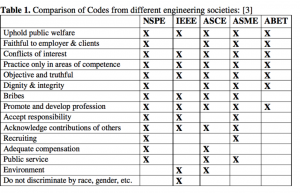I agree that being a software engineer, along with other issues, this field is surrounded by the ethical issues as well. Professional ethics are different from general ethics. For instance, a customer would rely on the guidance of a computer expert for an opinion on a product, and this does links to the trust that society shows in the expertise of the professionals. Muftic (2005) states “Behaving in an ethical and morally responsible way is crucial if engineers are to be respected as professionals. Certainly, they should not use their skills and abilities to behave in a dishonest way or in such a way that brings disrepute to the engineering profession.”
Computers play a vital role in all industries such as medicine, government, education, entertainment, etc. And software engineers make a massive contribution in the form of analysis, design, testing, developing and maintaining the software systems used by various sectors. A software engineer is in the position to misuse or influence the development process of these systems. To ensure professionalism, all the engineers should stick to the code of ethics in their professional practice.
Most engineering societies’ codes of ethics, like NSPE (National Society of Professional Engineers), IEEE (Institute of Electrical and Electronics Engineers), ACM (Association for Computing Machinery), ASCE (American Society of Civil Engineers), ASME (American Society of Mechanical Engineers), ABET (Accreditation Board for Engineering and Technology , AICE (Australian Institute of Computer Ethics), refer specifically to the paramount duty of upholding the safety, health, and welfare of the public. (Muftic, 2005)
The table below shows a comparison of codes from different engineering societies. (Muftic, 2005)

I would conclude on the note that technology doesn’t run itself, but it’s the human who is responsible for controlling them. So, while dealing with the technology, it is a software engineer’s responsibility to keep in mind the safety and well-being of the society. Today, we are barraged with technologies and the choices they bring in with them for our actions. Especially when developing the critical systems, it should be ensured that these systems are safe and reliable for the humans and their environment. Any risks associated with the systems should be identified and managed. Any costs involved in risk reduction must be calculated, and it must be kept in mind that how it compares with the organization’s objectives and the risks to the public. So, these systems should be thoroughly tested and then validated for use.
References:
Muftic, A. (2005) ETHICS AND SAFETY-CRITICAL SOFTWARE SYSTEMS. Available at: http://www.idt.mdh.se/utbildning/exjobb/files/TR0358.pdf (Accessed: 15 January, 2018)